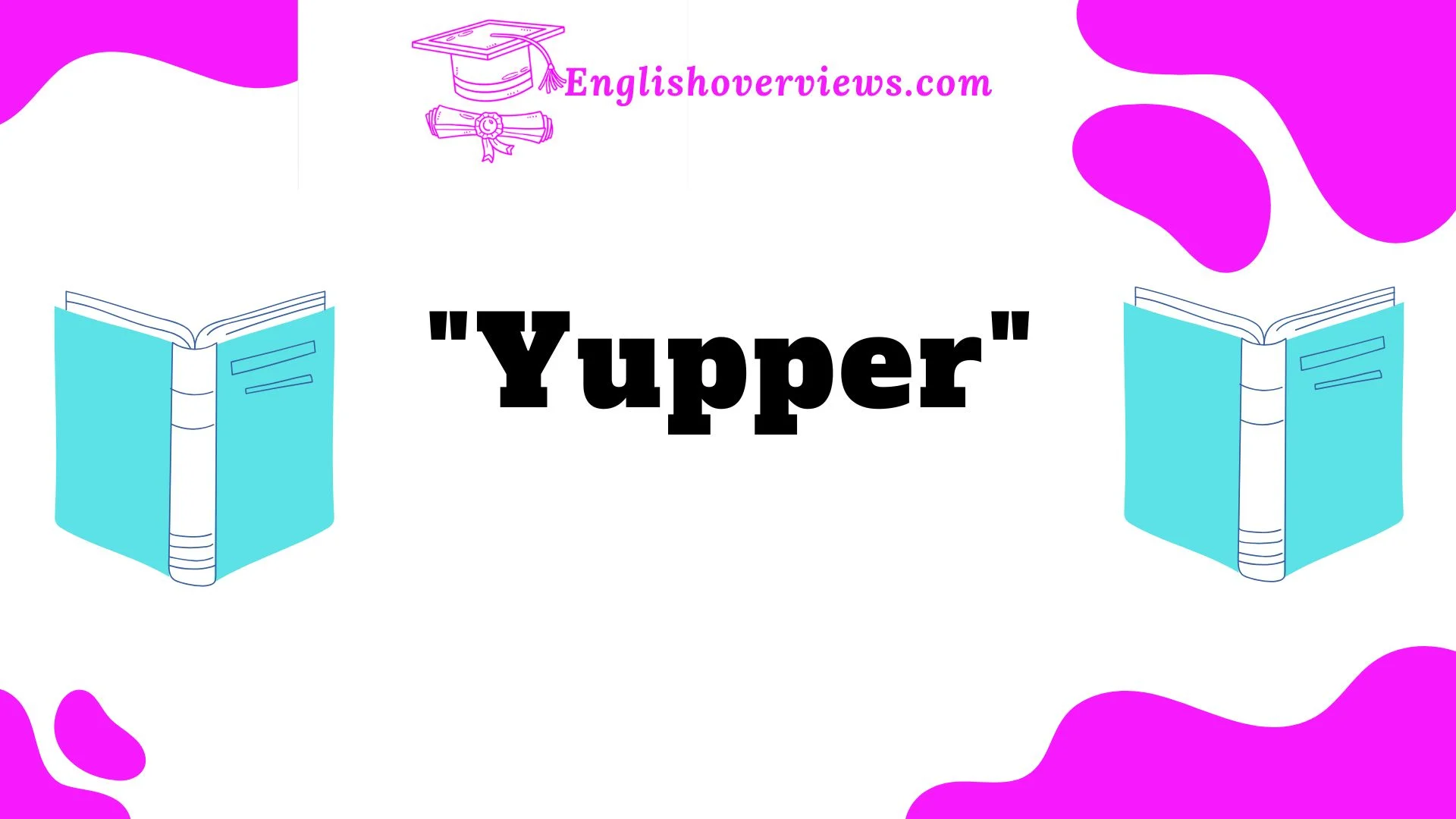The internet has given rise to many trends, one of the most intriguing being the evolution of slang. One term that has gained traction recently is “Yupper.” It may sound casual and playful, but there’s more to it than meets the eye. So, what does Yupper mean, where did it come from, and how has it evolved? In this article, we’ll explore all these questions and more.
We’ll take you through its origins, how it transitioned from the simple “yes” to the more playful “Yupper,” and how it compares to other slang words. You’ll also learn about its variant, Yuppers, and get examples of how to use it in everyday conversations.
We’ll dive into the linguistic perspective to figure out if “Yupper” is even a real word, and whether it’s here to stay or just another passing trend.
What Does “Yupper” Mean?
At its core, Yupper is an informal, playful way to say “yes.” It’s a response that conveys agreement or affirmation, but with a little extra flair. It’s the sort of word you might hear in casual conversation, often used by younger generations in texting, memes, and social media.
While it shares the same meaning as “yes,” Yupper has a unique tone. It’s often used to express enthusiasm or to add a touch of humor. For example:
- “Are we going to the movies tonight?”
- “Yupper, can’t wait!”
This word has a distinct, energetic feel, which is why it stands out from other simple affirmations like “yep” or “yeah.”
Origins of Yupper: Tracing Its Roots
The origins of slang words can often be difficult to trace. However, “Yupper” seems to have emerged from the same linguistic evolution that produced other casual variations of “yes,” like “yeah,” “yep,” and “yass.”
It’s important to note that Yupper isn’t necessarily tied to a specific region or culture. Instead, it grew organically within the online community as people found new ways to express themselves in a fun and quirky manner.
The earliest recorded uses of “Yupper” seem to appear on social media platforms like Twitter and Instagram around the early 2010s. It was a natural outgrowth of the growing trend toward simplified communication, where people often abbreviate words or add playful sounds to make their responses more expressive.
Regional Influence
Though “Yupper” is not specifically tied to one geographical region, it does seem to have been embraced by younger generations in the U.S. and abroad. This demographic has a penchant for creating unique variations of words to match their online personas and digital communication style.
Evolution of Yupper: From Yes to Yupper
You might wonder: how did we get from “yes” to “Yupper”? The evolution is more about cultural shifts in communication than a straightforward linguistic change. Here’s a quick breakdown of how this transformation unfolded:
- “Yes” – The formal, classic way to affirm or agree.
- “Yeah” – A more casual, relaxed version that became widely popular.
- “Yep” – Even more casual, often used in texting and informal conversations.
- “Yupper” – The playful, enthusiastic variation that emerged as a part of online culture.
As digital communication became more integral to our lives, words and phrases had to adapt. The speed and informality of texting, along with the rise of internet memes, made words like “Yupper” more appealing because they were easy to type and fun to say.
Why “Yupper” Took Off
The rise of platforms like Twitter and TikTok helped “Yupper” spread quickly. These platforms encourage short, snappy communication, which made this term a perfect fit for fast-paced conversations. Plus, its use in memes and pop culture gave it an extra layer of fun and relatability.
Yupper vs. Other Slang Terms
So, how does “Yupper” compare to other slang terms? Let’s look at some of the most common ones and explore the differences.
| Slang Term | Meaning | Tone/Use | Examples |
| Yes | Formal affirmation | Neutral | “Yes, I will attend the meeting.” |
| Yeah | Informal, casual affirmation | Relaxed, casual | “Yeah, I’m going.” |
| Yep | Informal affirmation | Casual, quick | “Yep, got it.” |
| Yupper | Playful, enthusiastic yes | Energetic, fun | “Yupper, I’m in!” |
| Yass | Over-the-top yes, often exaggerated | Dramatic, celebratory | “Yass, that’s amazing!” |
Key Differences
- Tone: While “Yupper” is energetic and playful, words like “yeah” and “yep” are more neutral.
- Context: “Yupper” is often used in more informal settings, especially in text or online chats. It may not be the best fit for a formal email or business meeting.
- Usage: You’re likely to hear “Yupper” more in social media exchanges, memes, and casual conversations. It’s a perfect fit when you want to show enthusiasm or humor.
Is Yupper a Word? A Linguistic Perspective
Linguists often debate whether slang terms like Yupper can be classified as official words. Since it’s not yet included in major dictionaries, you might wonder if it qualifies as a real word.
In linguistic terms, a word doesn’t need to be in the dictionary to be considered legitimate. As long as people understand its meaning and use it in everyday speech, it’s a word in practice.
Slang and Its Recognition
Language is constantly evolving, and slang terms like “Yupper” often pave the way for new words. Over time, some slang words gain enough usage and recognition to be included in formal dictionaries.
For example, terms like “selfie” and “hashtag” were once considered informal, but they’ve since become mainstream.
It’s entirely possible that Yupper could join the ranks of other slang terms that are recognized in linguistic circles as part of the changing language landscape.
Yuppers: A Variant of Yupper
If you’ve heard someone say “Yuppers,” you might be curious about its meaning. Is it just a variation of “Yupper,” or is there a difference?
“Yuppers” is simply a more exaggerated version of “Yupper.” It carries the same meaning but often adds an extra layer of enthusiasm. It’s commonly used in casual, friendly conversations where the speaker wants to show even more excitement or agreement.
For example:
- “Are you going to the party?”
- “Yuppers, I wouldn’t miss it for the world!”
While “Yupper” is a fun way to say yes, “Yuppers” often comes across as even more playful and expressive.
Real-Life Usage: Examples of Yupper in Context
Let’s explore how “Yupper” is used in real life. It’s not just about saying “yes” in a casual way—it’s about injecting energy and personality into your words.
Text Messages:
- “Are we still on for lunch today?”
- “Yupper! Can’t wait.”
Social Media:
- “Did you see the new Marvel trailer?”
- “Yupper, and it’s amazing!”
Memes and Pop Culture:
“Yupper” is often featured in memes, adding to its fun, light-hearted feel. For example, a popular meme might show a character enthusiastically saying, “Yupper, I’m ready for this!”
Conclusion: The Future of Yupper
Will “Yupper” continue to rise in popularity, or will it fade away like many other internet trends? The future of “Yupper” seems promising, especially given its strong connection to youth culture and digital communication.
As language continues to evolve, slang terms like “Yupper” reflect the changing dynamics of how we communicate—both online and offline. Whether or not it becomes an official dictionary word, Yupper is a fun, energetic way to say yes, and it shows how language can adapt to the needs of modern speakers.
FAQs About Yupper
- Is “Yupper” used in formal situations?
No, “Yupper” is primarily a casual, informal term, and it’s best suited for texting, social media, and friendly conversations. - Is “Yupper” a new trend?
While it’s relatively new, “Yupper” has been gaining popularity, especially in online communities, and it seems to be here to stay for now. - Can “Yupper” be used in professional settings?
It’s not ideal for professional or formal contexts. Stick to traditional affirmations like “yes” or “yeah” in those situations. - What’s the difference between “Yupper” and “Yass”?
“Yupper” is playful and enthusiastic, while “Yass” is typically more dramatic and exaggerated, often associated with excitement or approval. - Will “Yupper” eventually be added to dictionaries?
It’s possible! As with other slang terms, if “Yupper” continues to gain widespread usage, it could eventually make its way into official dictionaries.

English Overviews is a resourceful website dedicated to providing valuable content related to grammar and vocabulary. AD has made notable contributions, sharing insights on various subjects, including WordPress themes and plugins. The primary goal of the site is to help users improve their English language skills effectively.











